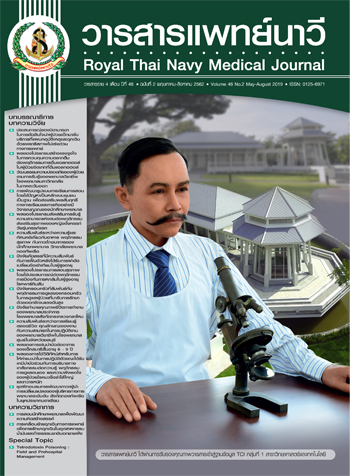The Effect of Motivation Interviewing for Craving Control Program on Alcohol Consumption in Schizophrenia and Alcohol Use Patients
Main Article Content
Abstract
This study is a quasi-experimental nonequivalent group design. The objectives of the study were to compare alcohol consumption in schizophrenia and alcohol used patients before and after received motivation interviewing for craving control program and alcohol consumption in schizophrenia and alcohol used patients between patients who received motivation interviewing for craving control program and those who received regular care. The sample consisted of 40 persons attended patients with schizophrenia and alcohol used at Somdet Chaopraya Institute of Psychiatric. They were matched pairs with scores on Alcohol Use Identification Test (AUDIT) then randomly assigned to the experimental and control group divided to experimental group 20 persons and control group 20 persons. The experimental group received motivation interviewing for craving control program and control group received regular care. The study in struments composed of 1) motivational interviewing combined with telephone for craving control program and 2) The Obsessive Compulsive Drinking Scale (OCDS). The 1st and 2nd instruments were verified for content validity by 5 professional experts. The reliability of the 2nd instruments was reported by Cronbach’s alpha coefficient as of 0.88. Data collection tools include Alcohol Use Disorder Identification Test (AUDIT) and reliability of the instruments was reported by Cronbach’s alpha coefficient as of 0.71. The data was analyzed using descriptive statistics and t-test, at .05 level.
Major findings were as follows:
- Alcohol consumption in schizophrenia and alcohol used patients who received motivation interviewing for craving control program was significantly lower than that before at p. 05.
- Alcohol consumption in schizophrenia and alcohol used patients who received motivation interviewing for craving control program was significantly lower than those who received the regular care at p. 05.
Article Details

This work is licensed under a Creative Commons Attribution-NonCommercial-NoDerivatives 4.0 International License.
References
2. Talamo A, Centorrino F, Tondo L, Dimitri A, Hennen J. Comorbid substance-use in schizophrenia: relation to positive and negative symptoms. Schizophr Res 2006;86(1-3):251-5.
3. Latt N, Jurd S, Tennant C, Lewis J, Macken L, Joseph A, et al. Alcohol and substance use by patients with psychosis presenting to an emergency department: changing patterns. Australas Psychiatry 2011;19(4):354-9
4. Somdet Chaopraya Institute of Psychiatric. Annual Report 2557. Somdet Chaopraya Institute of Psychiatric: Bangkok; 2015. (in Thai).
5. Saengcharncha P. Review of psychosocial treatment for alcohol dependence. Chiang Mai: Wanida press; 2552. (in Thai).
6. Hemarat K, Phaokuntarakom W, Hoonthasam S. The development of public health center nurses network to care for schizophrenic patients at home. Journal of Mental Health of Thailand 2012;26(2):1-15. (in Thai).
7. Sornsuwan S, Srikosai S, Saardarwut P. Effectiveness of motivational interviewing program among patients with schizophrenia and alcohol use disorder. Journal of Mental Health of Thailand 2012;20(3):144-53. (in Thai).
8. Tiffany ST, Cynthia AC. A cognitive processing model of alcohol craving and compulsive alcohol use. Addiction 2000;95(8):145-53.
9. Martio S, Carroll K, Kostas D, Perkins J, Rounsaville B. Dual diagnosis motivational intervention: a modification of motivational interviewing for substance-abusing patients with psychotic disorders. J Subst Abuse Treat 2002;23(4):297-308.
10. Munro T, Edward KL. Mental illness and substance use: an Australian perspective. International Journal of Mental Health Nursing 2008;17:255-260.
11. Santa Ana EJ, Wulfert E, Nietert PJ. Efficacy of group motivational interviewing (GMI) for psychiatric inpatients with chemical dependence. J Consult Clin Psychol 2007;75(5):816-22.
12. Baker AL, Hiles SA, Hide TL, Lubman DI. A systematic review of psychological intervention for excessive alcohol consumption among people with psychotic disorder. Acta Psychiatr Scand 2012;126(4):243-55.
13. Niaura R. Cognitive social learning and related perspectives on drug craving. Addiction 2000;95:155-63.
14. Miller WR, Rollnick S. Motivational interviewing: preparing people to change addictive behavior. New York: The Guilford press; 1991.
15. John UR, Driessen D, Wetteriling M, Dilling H. Motivational intervention: an individual counseling vs a group treatment approach for alcohol-dependence in-patients. Alcohol Alcohol 2003;38(3):263-9.
16. Srikosai S. Effectiveness of motivational enhancement therapy among alcohol dependent patients receiving follow-up sessions every 2 versus every 4 weeks on reduction of alcohol drinking problems. J Psychiatr Assoc Thailand 2009;54(3):259-72. (in Thai).
17. Wongpakaran T, Petcharaj K, Wongpakaran N, Sombatmai S, Boripuntakul T, Intarakamhaeng D, et al. The effect of Telephone-Based Intervention (TBI) in alcohol abusers: a pilot study. J Med Assoc Thai 2011;94(7):849-56.
18. McKay JR, Lynch KG, Shepard DS, Pettimati HM. The effectiveness of telephone–based continuing care for alcohol and cocaine dependence: 24–months outcome. Archives of General Psychiatry 2005;62(2):199-207.
19. Signor L, Pierozan PS, Ferigolo M, Fernandes S, Moreira TC, Mazoni CG, et al. Efficacy of the telephone-based Brief Motivational Intervention for alcohol problems in Brazil. Braz J Psychiatry 2013;35(3):254-61.
20. Chaipichitpan N. Motivational enhancement therapy: alternative care for drug abuse patient. Thammasat Medical Journal 2013;12(1):98-108.
21. Anton R, Moak DH, Latham P. The obsessive compulsive drinking scale: a self-rated instrument for the quantification of thoughts about alcohol and drinking behavior. Alcohol Clin Exp Res 1995;19(1):92-9.
22. Suktrakul S, Yunibhand J, Chaiyawat W. The effect of alcohol craving control program on alcohol consumption in alcohol dependence. [Doctoral Dissertation, Faculty of Nursing]. Chulalongkorn University; 2009.
23. Silpakit P, Kittiratanapaiboon P. Alcohol Use Identification Test (AUDIT). Bangkok: Thantawan paper; 2010. (in Thai).
24. Darakorn na Ayuthaya P. Success in alcohol abstinence from alcohol patients with psychiatric disorders. The Journal of Psychiatric Nursing and Mental Health 2013;27(1):1-15. (in Thai).
25. Gregg L, Barrowclought C, Haddock G. Reasons for increased substance use in psychosis. Clin Psychol Rev 2007;27(4):494-510.


